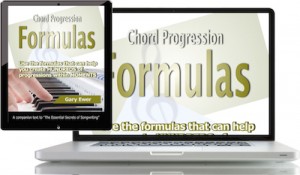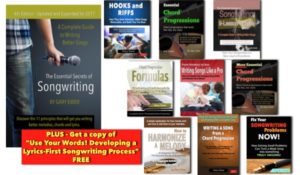Many years ago when I was a junior high school band director, a student asked me,”What is a professional?” Before I could answer, several students said, “Someone who gets paid for what they do.”
 “Chord Progression Formulas” shows you how to create dozens of great progressions practically instantly by using some powerful formulas. Get it separately, or as part of “The Essential Secrets of Songwriting 10-eBook Bundle”
“Chord Progression Formulas” shows you how to create dozens of great progressions practically instantly by using some powerful formulas. Get it separately, or as part of “The Essential Secrets of Songwriting 10-eBook Bundle”
In most fields of work, that’s probably the right answer. And in music, I suppose that’s also the right answer. But any time I was asked by a student to define the word professional, I’d usually give something like this as my answer:
True, if you get paid for what you do, you can be called a professional. But for me, a professional is someone who, once they’ve made a mistake, determines in their mind that they’ll never make that mistake again. And then they pay you!
Being paid for what you do is a lousy definition of a professional because that word should imply that you’ve set a high standard for yourself. The fact that you might be getting paid for what you do is the result of being professional, not the thing that makes you a professional.
Being a Professional Songwriter
The whole notion of being a professional is an interesting one in the songwriting world. At what point do you become one? Simply saying “When you make money you’re a professional” might technically be true, but I’d look at it differently, perhaps this way:
 Yes, I’m being paid to write music, so I’m a professional. But actually I became a professional — at least in my mind — when I determined that writing songs was going to be my way of expressing myself. I’m not writing primarily for money… I’m writing to offer my vision to the world through my songs. And I am devoting my life to it.
Yes, I’m being paid to write music, so I’m a professional. But actually I became a professional — at least in my mind — when I determined that writing songs was going to be my way of expressing myself. I’m not writing primarily for money… I’m writing to offer my vision to the world through my songs. And I am devoting my life to it.
That’s a very personal definition. In my own musical life, much of the music I’m writing is for choral groups. Most of the time I get paid for that work, but there are times that I might write music for which I don’t get paid — benefit concerts, or perhaps providing music for my own choir’s concert. Do I stop being a professional because of that music I wrote for which I didn’t take payment? Of course not.
Songwriting Success
This whole discussion touches on another important topic, which is this: What do you consider success to be? If you feel you’re successful when you can pay the bills by being a songwriter, that’s one definition, and I suppose there’s nothing wrong with it.
But if you feel successful because a song you’ve written expresses exactly what you were feeling in a way that makes you feel satisfied, that’s another important definition, and has nothing to do with whatever money you might make from it.
If you’ve been feeling frustrated or unfulfilled by songwriting lately, it’s worth the time to sit quietly and think on these two questions:
- Why am I a songwriter? And…
- How do I know when I’m being successful?
Knowing the answers to those two questions is vital to your own sense of happiness, success and fulfillment. If you don’t know what brings you happiness, how are you ever going to achieve it?
 As I say, it’s all very personal. For me, I just can’t tie my definition to how much money I’m making from writing, because I know I’ll be in for a life of stress, where my level of happiness will constantly fluctuate up and down.
As I say, it’s all very personal. For me, I just can’t tie my definition to how much money I’m making from writing, because I know I’ll be in for a life of stress, where my level of happiness will constantly fluctuate up and down.
If, however, I aim to express my inner self, and do that in a way that causes others to think and enjoy what I’ve written, then I can happy with that level of success, and I know I have a good chance of keeping frustration and dissatisfaction away.
What is your definition of musical satisfaction? Do you feel that you’re a professional songwriter? Is that the way you approach the activity? I’d love to know your thoughts on this, so please feel free to comment below.
 Written by Gary Ewer. Follow Gary on Twitter.
Written by Gary Ewer. Follow Gary on Twitter.
 “The Essential Secrets of Songwriting” 10-eBook bundle is being used by thousands of songwriters to polish their technique and develop their songwriting process. Don’t miss today’s FREE deal: a copy of “Use Your Words!”
“The Essential Secrets of Songwriting” 10-eBook bundle is being used by thousands of songwriters to polish their technique and develop their songwriting process. Don’t miss today’s FREE deal: a copy of “Use Your Words!”











I’ve been writing songs for 20 years but don’t think of myself as “a” professional. I more an amateur – “one who cultivates and participates (in something) but does not pursue it professionally or with an eye to gain.” And I like the etymology for amateur = “love / for.” I also like the distinctions around “craftsman” and “artisan” – and their love functionality and aesthetics. It’s a good question Gary… thanks
The dictionary says one who is qualified to teach apprentices. One who has gained a level of mastery of the learned professions. This is how I always looked at it, one who has gained a level of mastery of a subject. Who determines that? I believe the individual does and the quality or level of output of the person. Someone may be a professional poet or writer, but not be making any or much money. Same as being an artist or even a cook. I had a friend people would comment and say she could cook at a 5 star restaurant. She was a master chef and 100% self taught.